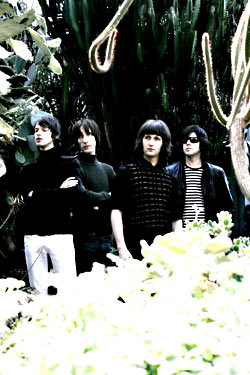“Really? Are you serious?!” says the Go frontman Bobby Harlow. He’s speaking via cell phone from the bowels of a hotel laundry room in DeKalb, Ill. His incredulous query is in response to my assertion that there’s a devoted Northwest fan base eagerly anticipating his Detroit-based band’s first Seattle appearance in more than five years.
Indeed, fans of Harlow’s garage-pop outfit are not as common as those of, say, the White Stripes, the band with which the Go shared member Jack White until 1999, before he and Meg began their steady rise to fame. But for those who have discovered one of the Motor City’s best-kept secrets, the announcement of their show at the Comet this Wednesday was serious cause for celebration.
The Go’s story begins almost 10 years ago, when Harlow teamed up with bassist Dave Buick and drummer Mark Fellis, an instinctively solid rhythm section who had been playing together since their early teens and shared Harlow’s abiding affection for ’60s psychedelia, sunny pop, and raunchy garage rock. Lineup shuffles resulted in a rotating cast of guitar players, with John Krautner eventually taking a permanent role as guitarist, occasionally sharing bass duties with Buick. Their burgeoning Detroit following impressed Sub Pop, who signed them and released their debut, Whatcha Doin’, in 1999. Though Whatcha Doin’ was well-received by fans and critics who appreciated the band’s careful craftsmanship and joyous, retro-visionary perspective, the relationship with Sub Pop soured when they turned in Free Electricity, their decidedly more acid-soaked sophomore effort.
“I enjoyed being on Sub Pop, actually,” recalls Harlow. “I liked our A&R guy, and I had some great conversations with Jonathan Poneman—he seems like a nice guy. But they basically believed rock ‘n’ roll didn’t stand a chance and [essentially] told us, ‘Put out your records, but don’t expect anything to happen.’ We sent them Free Electricity, this crazy psych record we were so excited about, and our A&R guy said, ‘Is this it? This record sounds like shit.’ When we sent it to all our friends, they thought it was spot on, and we were really proud of it. People certainly have different opinions,” adds Harlow, laughing at his stretch toward diplomacy.
After that derailment, the Go seemed to temporarily lose momentum, not resurfacing until 2003 with an eponymous release on British label Lizard King. The Go was well worth the wait, however, bristling with natural energy and radiating a profound appreciation for the raw, libidinous energy of ’60s garage, as well as an uncanny knack for replicating the heavenly vocal melodies that make bands like the Zombies and the Kinks a perpetual pleasure. Harlow openly acknowledges their appreciation for a bygone era, and cites Captain Beefheart, the Banana Splits, and the Shangri-Las as major influences, though a certain Four Seasons frontman as the primary inspiration. “The only thing we’ve ever really ripped off is Frankie Valli,” he admits. “If someone would come up to me and tell us we were the biggest Frankie Valli rip-offs ever, I’d be thrilled.”
Their vintage vantage point has now found its most finely honed embodiment in the release of Howl on the Haunted Beat You Ride, out this month on Cass Records, the Detroit label run by Dirtbombs drummer Ben Blackwell. Though Harlow had a hand in production and recording on previous releases, he was fully in charge this time, tracking the entire thing on analog eight- and four-track machines and mixing the final product in a manner so faithful to that Nuggets-era sound that he actually had to eventually make a modern compromise. “When we started playing this record for people, pretty much everyone asked us why it was so quiet,” says Harlow. “So we went back and remastered it.” That was a wise move, because songs as rich and memorable as the Ray Davies–esque “Caroline” or the cosmic rock boogie of “Yer Stoned Italian Cowboy” shouldn’t be buried under antiquated production techniques. This is especially true since it’s probably their most emotionally available work yet, with Harlow’s confessional lyrical focus clearly oriented toward pulling the listener in tight. “This record is really all about trying to write songs that people can relate to emotionally and connect with on a human level,” agrees Harlow. “That’s all we’re trying to do—it’s very much about just trying to bring some humanity back to pop music, because it seems to me that’s much of what’s missing these days.”








